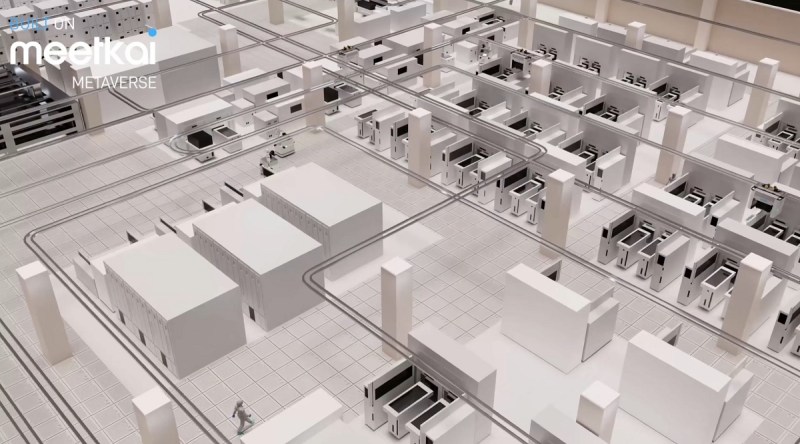We’re thrilled to announce the return of GamesBeat Summit Next, hosted in San Francisco this October, where we will explore the theme of “Playing the Edge.” Apply to speak here and learn more about sponsorship opportunities here.
The metaverse, digital twins, conversational AI and semiconductor chip packaging are all very different businesses. But they’re all under the same roof in the growing tech business group owned by billionaires Weili Dai and Sehat Sutardja.
And so it was a rare crossover when two of the businesses came together recently. Meetkai — which is pioneering tech in the metaverse and conversational AI — created a digital twin of the planned $2 billion Silicon Box chip packaging factory coming soon to Singapore.
The Silicon Box packaging factory is aimed at innovations in chiplets, or modules for chips that can be patched together to make “super chips,” which are connected together with speciaty packaging technology that Silicon Box will make. James Kaplan, CEO of Meetkai, said in an interview with GamesBeat it was helpful for training purposes to design the factory using the company’s metaverse tools to visualize what the final factory will look like.
A digital twin pivot

Digital twins are like the industrial version of the metaverse, the universe of virtual worlds first envisioned by author Neal Stephenson in the 1992 novel Snow Crash. Enterprises create digital twins of their factories so they can see what the factories will look like before they’re built. The digital twins help to perfect the designs. And sensors on the real factories can feed data back to the digital twins to improve the overall design. While MeetKai started with conversational AI and then tried the consumer metaverse, now it is seeing opportunities in digital twins.
Event
VB Transform 2023 On-Demand
Did you miss a session from VB Transform 2023? Register to access the on-demand library for all of our featured sessions.
Silicon Box recently celebrated the private grand opening of its physical 800,000 square-feet facility in Tampines, Singapore, while simultaneously introducing MeetKai’s digital replica in the metaverse. By leveraging the power of advanced AI and metaverse technologies, MeetKai has created a virtual replica of Silicon Box’s new facility, offering opportunities for business growth and talent development.
“Using advanced AI-powered and metaverse technologies, we are able to build virtual replicas of any physical setting valuable to businesses,” said Kaplan. “Including professional training centers, orientation tours, and live creative collaboration platforms at fractions of the cost and time that were previously thought possible.”
The factory will be home to thousands of jobs in the future, and the Meetkai digital twin will survey as a recruiting tool to help bring those employees on board, making it easier to visualize the kind of jobs that those employees will be doing. Meetkai used generative AI to try to improve the tech.

“We’re extremely proud of MeetKai’s leading-edge metaverse and AI technology and its potential to power the global semiconductor industry in new and disruptive ways,” said Dai, cofounder and executive chairwoman of MeetKai. “Our partners play a critical role in driving MeetKai’s mission to deploy groundbreaking, yet accessible metaverse and AI technologies to the masses. We look forward to continuing our strategic alliance with Silicon Box, who is solving a key issue hampering adoption of chiplets by providing a real-world practical solution for advanced packaging for next-gen computing platforms integral to the AI era.”
As Los Angeles-based MeetKai expands its offerings to businesses worldwide, it aims to provide AI-powered virtual solutions that enable better customer, client, and employee engagement. The company’s metaverse creation tools, renowned for their cost-effectiveness and user-friendly interface, empower users to build virtual worlds rooted in reality and true utility, accessible through any web browser.

For this purpose, Dai said in our interview that Silicon Box is just the beginning for Meetkai. Another customer plans to use Meetkai to deploy a large Unity-based project so that it can reach a lot of people across an organization. An energy company wants to training people in how to monitor an electric grid and repair things in the field, accessing the data from any location. Another company is discussing using Meetkai for prototyping its trade show floors ahead of events.
Where to focus?

Asked if digital twins will be more lucrative than the consumer metaverse, Kaplan said, “We want to build the best platform in general. It can be multipurpose, and we’re trying to diversify as much as possible because we learn things. I would say that we’ve already had a lot of benefits on the consumer side since we’ve gotten better at dealing with equipment automation. And like once you can deal with equipment automation on the business side, there are lot of consumer applications as well we can do.”
Dai is excited that Meetkai is operating in the metaverse space and it’s bridging both the consumer and enterprise worlds, as that gives it multiple opportunities to pursue. She also said it was encouraging to see Apple announce its mixed reality headset, the Apple Vision Pro. And while it’s expensive at $3,500 (coming next year), it shows that Apple believes in the digital spaces as well, even though Apple hasn’t yet come to admit that it’s interested in the metaverse.
As for the metaverse being dead? Kaplan said, “We’ve gotten a lot more traction ever since the ‘metaverse is dead’ pieces started coming out.
Kaplan said that one reason to be in the metaverse is that these virtual spaces will need autonomous agents to be able to interact inside them. People are going to need to make use of virtual humans and avatars to navigate those worlds. They will need autonomous agents to help them in a normal, conversational way. On the consumer side, we’ll deal with AI-based virtual salespeople. And people will need virtual AI copilots to help them with training and other tasks, Kaplan said. In other words, AI is going to help the metaverse function better and develop faster.
“We found that companies have legitimate interests in it,” Kaplan said. “We’re happy to clean up on the practical applications. We see value in the underlying concept.”
GamesBeat’s creed when covering the game industry is “where passion meets business.” What does this mean? We want to tell you how the news matters to you — not just as a decision-maker at a game studio, but also as a fan of games. Whether you read our articles, listen to our podcasts, or watch our videos, GamesBeat will help you learn about the industry and enjoy engaging with it. Discover our Briefings.






